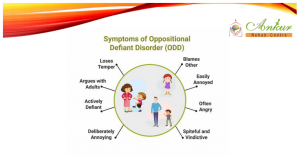
Not everyone is aware of ODD, but still, many people are suffering from it. ODD, acronym of Oppositional Defiant Disorder (ODD), is a childhood mental health condition that includes disruptive behavior.
This is sure that every child does have occasional outbursts of frustration and disobedience. But this does not mean developmentally proper temper tantrums or willful behavior. Rather, ODD concerns:
- a long-standing practice of unruly and argumentative behavior or mindsets toward teachers, caregivers, or other adults
- vindictiveness toward others
- a repeatedly disobedient and furious mood or short temper
ODD makes it very difficult for patients to interact with other people. Again, the manners that describe this situation go beyond what’s typical for a child’s age and developmental phase.
Basically, by the age of 4, Tantrums typically begin to grow less in scope. So, you might have some cause for concern when a school-aged child continues to have regular tantrums, especially ones extreme enough to disrupt day-to-day life.
Let’s learn more about ODD, including its symptoms, causes, treatment, and more. Hop on!
Symptoms
Most of the time, it’s not easy to find out the difference between an emotional child, a strong-willed, or one with the oppositional defiant disorder. It’s entirely acceptable to demonstrate oppositional behavior at some phases of a child’s development.
Signs of ODD mostly kick off during preschool years. However, it may develop later, but mostly before the early teen years. These behaviors cause vital impairment with family, school, social activities, and work.
Angry and irritable mood:
- Frequently and readily loses temper
- Is often touchy and easily irritated by others
- Is constantly furious and upset
Argumentative and defiant behavior:
- Often debates with adults or people in authority
- Often vigorously withstands or refuses to comply with adults’ demands or regulations
- Often purposefully annoys or disturbs people
- Often condemns others for their blunders or misconduct
Vindictiveness:
- Is usually spiteful or vindictive
- Has led spiteful or revengeful behavior at least twice in the past six months
Causes
When it comes to ODD, there is no known or fixed cause, but the disorder has been linked to a blend of factors like biological, psychological, and social.
Biological factors include:
- A parent with a history of ODD, or CD
- A parent with a substance use disorder
- If mother smoked throughout pregnancy
- Irregular levels of neurotransmitters in the brain
- Vulnerability to toxins
- Insufficient nourishment
Psychological factors include:
- A careless or lacking parent
- A poor connection with the parent
- Problem or an incapability to form social relationships or process social cues
Social factors include:
- Abuse or neglect
- Messy environment
- Relative instability (like divorce or frequent moves)
- Conflicting discipline
- Lack of supervision
- No money
- Less involved parents
Sometimes, ODD appears simultaneous with other disorders or mental issues, like depression, bipolar disorder, anxiety issues, etc.
Takeaway Thoughts
Signs of ODD slowly enhance for many youngsters within the state, particularly when they have both professional and house support.
An expert who deals with childhood mental health conditions can offer more advice and help.
Are you looking for an expert? Reach us at Ankur Rehab Centre, one of the leading Mental Health Rehabilitation Center.
Being a growing Psychiatric Rehabilitation Centre, we care for our patients with not only substance use but also mental health issues. So, if you are in need of any of your loved ones, get in touch. Call +91-9893765543, +91-9109775299





